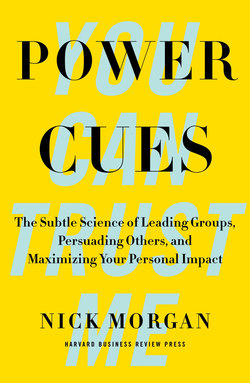Читать книгу Power Cues - Nick Morgan - Страница 31
На сайте Литреса книга снята с продажи.
When You Talk, Do People Listen?
ОглавлениеOnce you’ve estimated your intuitive abilities, then it’s time to get a rough sense of your charisma quotient. The danger of self-deception here is very real, but do the best you can. Look at your diary and notice yourself when you’re with others. How often are you the center of attention? When you speak, like the E. F. Hutton TV advertisement from the 1970s had it, does everyone listen, or not so much?14 How often do you dominate a meeting, without much apparent effort, just feeling in the zone as you put your ideas across?
Do people hear you out, or do they stop listening before you’re done? Here, it may be useful to imagine a range, where ten is some guru whose disciples hang on his every word, and one is a crazy homeless person in the street whom few people actually listen to. How do you rate yourself?
How about your own emotions? Are they close to the surface and easily accessed, or are you slow to ignite? Do your emotions mostly leave you alone, or are they constantly nagging at you, demanding your attention and reaction?
Most of us are not actually the center of attention most of the time. Those of us who do command attention more than occasionally belong to that select group of people the rest of us think of as charismatic. Most of us have charismatic moments, but those special few are “on” virtually whenever there’s a group around them—and that’s most of their waking hours. Most of us keep our emotions in check most of the time.
You may not have realized that there’s a connection between those two sets of behaviors; there is. You can learn how to turn on charisma. It’s controllable; it’s not magic or something given to a select few at birth. Charisma is focused emotion, but I’ll talk much more about that later. Showing you how to control your own charisma, so that you can turn it on and off when you want to, is another one of the purposes of this book.
Confidence, intuition, and charisma. These are the raw ingredients of mastery. Oh, yes, and one more: leadership. What kind of natural leader are you? Again, just try to note your behavior without judgment in these first few weeks on the road to mastery. You need to have a realistic sense of who you are and how far you have to go in order to get the most out of this book. So study yourself and your behavior when you’re with your colleagues, family, and friends. When you make suggestions, do people generally go along with you? Do your plans, ideas, and feelings generally get implemented, acted on, and acknowledged, or do you feel ignored and misunderstood?
Natural leaders, by definition, are few and far between. Most of us are listened to occasionally; natural leaders effortlessly dominate the meeting, the occasion, or the party most of the time. Again, this dominance is something you can learn to switch on, augment, and create in yourself so that you can lead when you want to and follow when that suits you, too.
For now, you’ve completed your personal inventory, and you understand the connections among a complex of communications tenets: how you show up, how you create and transmit thought via your gestures, and how other people read you. You’re ready for chapter 2.
